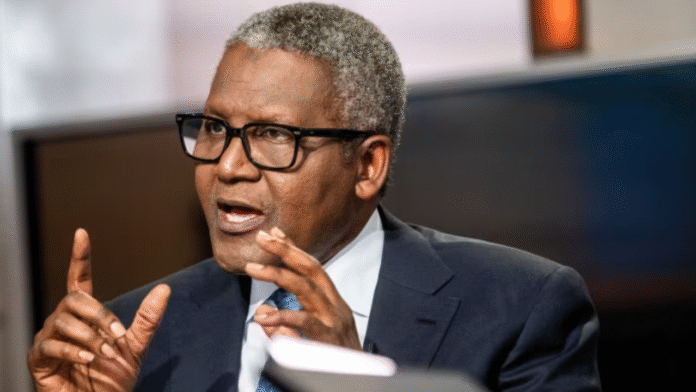Africa’s richest man and the President of Dangote Group, Aliko Dangote, has accused the Nigerian Union of Petroleum and Natural Gas Workers (NUPENG) of collecting as much as ₦50,000 on every truck that loads fuel at the refinery, warning that such charges ultimately push up fuel pump prices and burden consumers.
While NUPENG neither confirmed nor denied the allegation, industry experts on Sunday wondered how the oil union became a tax collector, stressing that such actions would definitely raise the pump prices of refined petroleum products.
Speaking to newsmen while responding to NUPENG’s accusations that his company is preventing drivers of its newly deployed 4,000 Compressed Natural Gas-powered trucks from joining the union, Dangote said the union’s levies are unsustainable.
“I am saying that there are several charges here, where if a truck is going to load, NUPENG has been collecting about N50,000 or N48,000 on each truck. By the time everybody collects their own, you are talking about N80,000 to N84,000. So, who pays for that cost? The consumer actually pays,” Dangote declared.
He described such charges as acts of rent-seeking that discourage efficiency in the sector. According to him, the company has learned from its past experiences as a fuel importer, when transporters allegedly held Dangote Group “by the neck,” compelling him to establish an in-house fleet under his brother’s management.
“Now that we have launched our own CNG trucks, we will not allow any group to hold us hostage. If there is no evacuation, there is nothing we can do,” he stressed.
Dangote further reiterated that no driver or worker should be compelled to join a union, insisting that the constitution and labour laws make union membership voluntary. “If anybody wants to join the union, even our own workers, we say, ‘Fine, go and join.’ But it must be voluntary. Even religion is voluntary—you cannot force anyone to convert,” he said.
Contacted for comments, NUPENG President, Williams Akporeha, neither confirmed nor denied the allegation of ₦50,000 charges. Instead, he responded cryptically: “N50k (N50,000) now? No more N1 per litre?”
In an earlier response to viral claims that the union imposed ₦1 per litre charges, Akporeha had maintained: “One can’t stop people from having their opinion. Ask who alleges to provide proof.”
The controversy comes after NUPENG shut down depots recently and briefly blockaded the Dangote refinery over disputes surrounding drivers’ unionisation. The Federal Government intervened, brokering a memorandum of understanding between the parties. However, tensions remain high despite an industrial court order in Abuja barring NUPENG from further blockades.
Industry experts have weighed in, raising concerns about the legality of NUPENG’s alleged levies. Professor Dayo Ayoade, an energy law specialist, questioned whether the union has overstepped its mandate.
“The job of a union is to assist its members and protect their jobs, but it doesn’t have a right to tax or collect fees for fuel loading. Is NUPENG now a tax-collecting agency? That is the question,” he argued.
He suggested that Dangote’s insistence on managing his own fleet is a way of avoiding such pressures. “If truck drivers are independent of the union, no one body can hold the entire country to ransom. Let competition reign. NUPENG should make itself attractive so drivers join voluntarily,” he said.
Dangote’s allegations strike at the heart of Nigeria’s energy pricing structure. With pump prices already high due to foreign exchange pressures and logistics costs, any additional charges at the refinery level further worsen affordability for households and businesses.
Analysts argue that such hidden costs, if confirmed, effectively act as an informal tax on energy consumers, undermining the government’s broader efforts to stabilise prices and encourage the adoption of alternative fuels like CNG.
To forestall disruptions, Dangote Group has invested heavily in 4,000 CNG-powered trucks for petroleum product distribution nationwide. This move, Dangote said, ensures independence from third-party transporters and unions that could hold operations hostage.
The trucks are part of the refinery’s strategy to cut reliance on imported diesel, reduce costs, and demonstrate commitment to Nigeria’s energy transition. While stakeholders acknowledge workers’ rights to organise, they caution that coercion, excessive levies, or blockades could derail confidence in Nigeria’s refining sector at a critical time.
Experts have urged the Federal Government to investigate the allegations, establish clear regulatory frameworks for truck loading charges, and strike a balance between protecting workers and shielding consumers from arbitrary costs.
The PUNCH



